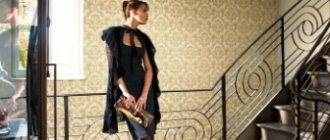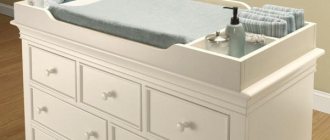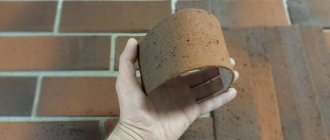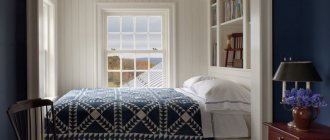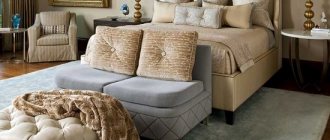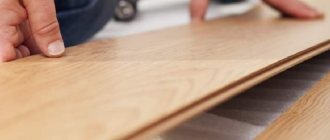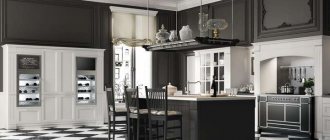Flexible tiles have excellent performance characteristics, they are very presentable, and their price is quite reasonable. Let's consider the varieties of this popular roofing material so as not to make a mistake with the choice of coating
One of the main advantages of flexible tiles is that... that it is capable of “covering” pitched roofs of any complexity and configuration, up to domes and onions, and with a minimum percentage of waste.
EVERYTHING YOU NEED FOR THIS ARTICLE IS HERE >>>
At the same time, this roofing material has proven itself well in a wide variety of climatic conditions. It can withstand temperature changes from -45 to +110 C and strong winds, and is resistant to corrosion, rotting, and delamination. The soft roof covering muffles the noise of rain and hail, providing comfort regardless of the weather.
It is also important that the material is moderately flammable, that is, it will not ignite from a spark or a cigarette falling on the roof and will not become a fire carrier. Additional components for flexible tiles (underlayment, glue, valley carpet, ridge-eaves elements, etc.) guarantee protection of the most vulnerable areas of the roof, and shingles of various shapes and colors will help create the original appearance of the house and organically fit it into the landscape.
Flexible bitumen shingles are offered on the domestic market. "TechnoNIKOL" (trademarks SHINGLAY, MIDA, TILERCAT). CertainTeed (Saint-Gobain concern), (copal. Katepal. Kerabit, Tegola, Ryazan cardboard and roofing felt plant (RoofShield trademark).
The tile shingles are covered with mineral granules in a volume that is 10% higher than technological standards, so that the top layer of material is not disturbed during transportation. Excess crumbs fall off during installation
Link by topic: Installation of metal tiles with your own hands (photo)
No. 1. Composition of flexible tiles
The material called flexible tiles is also popularly called soft tiles, bituminous shingles, roofing tiles, shingles and even shingles, named after the main domestic manufacturer of the material. It is sold in the form of small flat sheets of various shapes and colors. High performance qualities are due to production technology.
Soft tiles consist of the following layers:
- the base is fiberglass , much less often organic cellulose. Fiberglass is obtained from a molten mass of inorganic glass; the fibers are bonded together thanks to special additives. Fiberglass canvas today is produced using wet and dry methods . The first involves strong grinding of raw materials, foaming of the mass on a molded canvas, on top of which a binder and film are applied. The dry method involves squeezing molten glass through dies and molding fibers that are woven together to form a web. After processing the canvas with binders, drying occurs;
- layers of bitumen with polymer additives (often one or two). Bitumen is a resin-like organic substance of natural origin, with which fiberglass is impregnated to give the future product properties such as flexibility, strength, and resistance to critical temperatures. To improve the performance qualities of flexible tiles, bitumen is modified with polymer additives ;
- the top decorative layer is made of basalt granulate, silicon or shale chips. It gives the product the required color, brings it closer in aesthetics to natural tiles, and also plays the role of additional protection from mechanical damage, moisture, ultraviolet rays, and protects the bitumen layer from melting under the influence of high temperatures. The topping also increases strength and durability. Basalt is the most preferred and common coating option. Its particles fit tightly to each other and are better fixed on the surface. Slate has the property of absorbing oils contained in bitumen and changing color;
- bitumen-polymer layer with a self-adhesive base ;
- film to protect the previous layer.
Polymer additives that modify bitumen deserve special attention . The properties of soft tiles depend on them. The following are usually used as additives:
- styrene-butadiene-styrene (SBS), also known as artificial rubber or thermoplastic, makes bitumen more elastic, resistant to frost and high temperatures. Excellent for use in regions with cold climates and sudden temperature changes, so in domestic conditions this is the best option;
- atactic polypropylene (APP) allows bitumen to withstand very high temperatures, makes it resistant to sunlight, but does not protect against frost - an option for regions with hot climates.
There is also oxidized bitumen , which is produced by treating bitumen with oxygen, starting the process of artificial aging. Due to this treatment, service life and resistance to low and high temperatures are increased. In terms of elasticity, such bitumen is inferior to SBS-modified, but is cheaper and is fully applicable in domestic conditions.
The type of bitumen used can be determined by external inspection of soft tiles. It is enough to pull the corner of the top layer, and if the bitumen stretches, we see its modified version; if it breaks, it is oxidized.
What is the roof made of?
Soft roofing has a rather complex composition. It contains several layers, which form solid roofing sheets.
So, here are the layers the material consists of:
The base is not woven type. Even earlier, in Soviet times, cardboard or cellulose were used as this material. Over time, the composition improved and it was found that if fiberglass was used instead of a cardboard base, then all parameters would improve.
Read: Two-story house - the best projects, modern ideas, beautiful interior and exterior options (100 photos + video)
«>
The base serves as a reinforcing layer, protection against stretching and damage, and also seals the material. Due to the use of cardboard, the tiles were badly rotted.
Improved bitumen. It has the ability to create a dense layer that helps give the tiles rigidity. This layer is used to thicken the material and bond the roof monolithization. In addition to these qualities, bitumen serves as a water-repellent element.
Colored inclusions from crushed rocks. They create a decorative coating, and also make the tiles stronger and more resistant to external influences. Thanks to stone chips, bitumen is not exposed to sunlight.
The bottom layer is a film protection to prevent the tile parts from sticking to each other. You will definitely need strips for flexible tiles during the installation process.
No. 2. Advantages and disadvantages of flexible tiles
The peculiarities of the production of soft tiles determine their excellent performance qualities, which, in turn, create great demand. Among the main advantages of flexible tiles:
- ease of installation and transportation due to low weight and compact dimensions. There will be no need to construct a reinforced rafter system, and this is a significant saving;
- complex shapes for , and there will be a minimum of waste ;
- resistance to all negative environmental factors , however, it is necessary to choose soft tiles of the appropriate composition. The material is not afraid of sunlight, moisture, ice, frost, corrosion, mold, and therefore boasts high durability (about 50 years), and manufacturers give a multi-year guarantee for their products;
- the material does not fade in the sun and does not change its color over time;
- excellent heat and sound insulation , allowing you to maintain an optimal microclimate in the house and not suffer from noise during rain;
- beautiful appearance , a huge selection of colors and shapes, the ability to imitate natural tiles;
- health safety;
- soft tiles are dielectric , so there is no need for a lightning rod;
- resistance to fire, since combustible bitumen is covered with stone particles on top.
Among the shortcomings we note:
- relatively high price . Compared to metal tiles or slate, roofing tiles are, of course, more expensive, and compared to natural tiles, the material seems to be a budget option. In any case, the cost of purchasing bitumen shingles is offset by its durability and minimal waste;
- the need to construct a solid base on which the material will be installed. The base is made from edged boards (an expensive option), plywood, but its performance is not the best, or OSB boards. The latter are considered the optimal solution;
- installation cannot be carried out at subzero temperatures , but there is a trick here too. If before laying the tiles you keep them in a warm room and warm them up with a hairdryer, then installation can be carried out down to a temperature of -150C.
Soft tiles are a universal material for covering the roofs of private houses, public and commercial buildings, and industrial buildings. Roofing tiles are installed on roofs with a slope of more than 12 degrees, and if the slope is more than 45 degrees, then each element will have to be reinforced with 2-4 nails.
General information
Flexible tiles by their nature are one of the types of soft roofing used for arranging the roofs of private houses and commercial buildings. In general, flexible tiles are a bituminous material that has a rectangular shape. Externally, these rectangles (shingles) are small in size and have shaped cutouts on one side.
Installation of the material must be overlapped. The main advantage of bitumen shingles is their versatility; they are suitable for any type of roof, regardless of the design, slope angle and complexity of the configuration.
This material was first heard in America more than a hundred years ago. In the United States of America, flexible tiles remain the most popular roofing covering to this day; they are used by most builders and homeowners, as the tiles have good performance characteristics and a number of advantages.
Among the main advantages of the material, one should highlight its affordability, ease of installation and operation. In addition, soft tiles have an attractive appearance and a long service life. The material appeared on the territory of the Russian Federation not so long ago, but has already managed to fall in love with many owners of private houses, architects and professional builders.
No. 3. Why are flexible tiles better than their competitors?
Among the main competitors of flexible tiles are roofing coverings such as ondulin, slate, metal tiles and natural tiles. Soft tiles are more expensive than the first three analogues, but buyers often prefer them, because they are superior to slate and ondulin in aesthetic qualities, durability, amount of waste and ease of installation. Metal tiles can compete in appearance, but their downside is a lot of noise during rain and the possibility of corrosion when the protective layer is deformed. Flexible tiles are quiet and are not afraid of rust.
All that remains is natural tiles , which can boast record durability, neutrality and excellent appearance, which manufacturers of soft tiles are so eager to repeat in their collections. However, the natural analogue is much more expensive, requires reinforcement of the rafter system, is difficult to install and requires periodic monitoring of the condition of the roof and replacement of damaged elements.
No. 4. Types of flexible tiles according to the method of cutting sheets and color
Roofing material is usually evaluated based on a variety of parameters, with appearance being taken into account first. Aesthetics depends not only on the color, but also on the shape of the element. Today, manufacturers of soft tiles offer us the following options for cutting sheets:
- shingles;
- rhombus;
- rectangle;
- oval;
- hexagon;
- "brick";
- "beaver tail";
- "dragon tooth"
Some of them are designed to imitate natural materials, for example, ceramic tiles, while others are designed to give the roof an original look. Almost every manufacturer strives to present these standard names in their own way in order to distinguish the product from analogues from competitors. In addition, in the collections of companies engaged in the production of soft tiles, you can find products of other shapes.
The variety of colors is even greater. Tiles in red-brown, green and blue shades are popular, but the choice is not limited to this. Manufacturers have learned to create not only monochromatic products, but also with a transition from one color to another, and the capabilities of modern technology make it possible to paint in almost any shade, and with a 3D effect. Changing the color of the topping and base, the shape of the sheet and the pattern on it, as well as the glossiness and dullness parameters allows you to achieve original effects or complete resemblance to clay or wooden tiles.
On sale you can find three-layer soft tiles , which differ from the usual two-layer tiles not only in price and even better performance, but also in appearance. The third layer is applied with a slight offset, which allows you to achieve the effect of volume and relief, and this has a positive effect on the aesthetics of the coating.
What is a soft roof and what is it made of?
As we noted earlier, the basis of the building material is still the same roofing material. It has been used for waterproofing roofs for decades and has high wear-resistant characteristics. Thanks to this quality, manufacturers of modern roofing materials paid attention to it. However, durability is not everything; one of the main disadvantages of roofing material is its low tensile strength. Over time, the material simply crumbled. In modern variations of soft roofing, one very important change has appeared - roofing felt has received a very durable base - fiberglass.
Fiberglass is an environmentally friendly coating that can have different densities
Fiberglass consists of fiberglass threads and organic resins. There are several classes of material strength. This material was taken as a reinforcing coating.
The structure of bitumen itself has changed. It included more advanced additives that increased its resistance to negative environmental factors: low temperatures, overheating, high humidity, and so on.
And the structure of the finished material itself became similar to adhesive tape; on one side, the coating received a sticky base, which significantly simplifies the installation process
No. 5. Types of soft tiles by modification
Installation of a roof made of bitumen shingles requires the use of elements of different modifications:
- row tiles are those that form rows and make up the main part of the roof covering;
- ridge tiles are used to arrange the joints of roof slopes and the ridge, giving the roof a finished look;
- eaves tiles are intended for arranging eaves, that part of the roof that takes on the greatest load in the autumn-spring period, being exposed to melt water and ice. The elements of such tiles have increased thickness;
- ridge-eaves tiles combine the characteristics of the two previous types and are universal.
No. 6. What to consider during an external inspection?
Sometimes a visual inspection will tell you much more about the quality of soft tiles, rather than the manufacturer’s description of the technical characteristics. To choose high-quality flexible tiles, when purchasing, pay attention to the following points:
- flexibility . A high-quality product must be flexible and elastic - this is the key to its durability and practicality. To check the flexibility, just try to bend the material, not fold it in half, but bend it a little. A high-quality product will bend without problems and then return to its previous state;
- There should be no smell of bitumen , because this is the first sign that it is actively evaporating, and this threatens to lose its elasticity in the near future;
- The coating of stone chips should be uniform and dense and not crumble. If more than 2 g of chips fall from one shingle, it is a poor quality product;
- the presence of a self-adhesive surface greatly facilitates the installation of flexible tiles, but it is important that no more than 6 months have passed since the production of the product, otherwise you will have to deal with a construction hair dryer;
- The thickness of a single-layer shingle should not be less than 4 mm. Multilayer elements will be somewhat thicker, they have increased resistance to moisture and wind.
Soft tiles are sold in packs of 22 elements, which approximately corresponds to 3 square meters. m of finished coating. Packaging weight ranges from 5-8 kg for single-layer products and up to 20 kg for multi-layer products. Experts recommend using elements from different packages during installation - this guarantees that the roof will be aesthetically pleasing, even if the color of the material in different packages is slightly different. The quality and durability of a roof made of soft tiles depends on the preparation of the base - violation of the technology can lead to a significant reduction in service life.
Cons of soft tiles
Everything in this world has its drawbacks, and bitumen shingles are no exception.
The installation requirements for budget coating options are quite extensive. For example, large tiles need to be securely attached with a large number of nails or screws. The lower belt of the roof is installed first, and then they are raised up from it, which can cause inconvenience when installing the covering of pitched roofs.
The weight of the tile depends on the number of layers in the material. If the cost of the tiles is in the middle of the general price range, then a description, passport and fire safety certificates are attached to it.
Installation of bitumen shingles is quite complicated
Return to content
No. 7. The best manufacturers of soft tiles
The United States is considered the trendsetter in the field of flexible tiles, because it is there that the material is most popular, at least for now. Major companies such as Owens Corning, GAF and CertainTeed operate there, but their products are poorly represented on the domestic market, since analogues from European companies are not inferior in quality and variety, and are cheaper. A couple of years ago, due to the crisis and the decline in European production, the soft tile market shrank by almost a third, to which domestic manufacturers could not help but respond, who instantly increased their turnover and flooded construction stores with their products. Which soft tile manufacturers can you trust?
- Tegola is an Italian company, operating since 1973, and is a leader among European countries in terms of production volumes of bituminous shingles. The manufacturer’s priority is not only performance, but also appearance, so in the company’s collections you can find unique tiles, for example, with copper coating. In total, the manufacturer offers several collections, with a dozen shapes and about a hundred different colors. Factories and representative offices are located in 73 countries around the world, and thanks to the launch of a plant in the Ryazan region, high quality has become more affordable for domestic buyers.
- Katepal OY is the largest Finnish manufacturer of soft tiles, selling them under the Ruflex brand. It has been operating since 1949, selling products to countries in Europe, the Middle East and Asia. In production, improved bitumen of the highest quality is used, which ensures frost resistance of the products. The manufacturer takes into account Russian climatic conditions and supplies the domestic market with products that are most suitable in terms of characteristics. The variety of species, of course, is not the same as that of the Italian competitor, but it is still very rich and allows you to choose the appropriate option. The assortment includes double-layer tiles. Prices are above average.
- Icopal is another large Finnish manufacturer that offers high-quality tiles manufactured using modern equipment and using the best materials. Only SBS-modified bitumen is used, the range is small, but includes all the most popular colors and shapes, prices are average.
- IKO is a company with production facilities located in Canada, Belgium and Slovakia. The range of soft tiles is huge, there are custom-designed shapes, and the variety of shades is very wide. The tiles are produced mainly using oxidized bitumen, prices are average.
- CertainTeed is one of the few American companies whose products can be found on the domestic market. The assortment is amazing; some products have no analogues and are not found in other manufacturers. The price is high.
- BRAI is an Italian manufacturer offering soft tiles with copper coating.
- Kerabit is a Finnish company distinguished by a sufficient range and high quality of products. Prices are average.
- The group produces the famous soft tiles Shinglas and Tilercat. Industrial capacity is constantly growing, customers are offered new colors and shapes of the material. All products comply with European quality standards, but at the same time they cost 1.5-2 times cheaper than foreign analogues. There are, of course, elite, expensive options, but, regardless of the price, all products are of good quality and durability. The company offers several collections of soft tiles: the material differs in shape and color, number of layers (there are multi-layer products), there are also products with record performance qualities, and they are guaranteed for 50 years.
- The group has two factories in Russia, has been operating since 2005 and has representative offices in almost all regions of the country. The choice of tiles is sufficient, oxidized and SBS-modified bitumen is used, the warranty for economy-class products is 20 years, for more expensive ones - 50 years.
Soft tiles are an almost ideal roofing material that will last for decades, you just need to choose a quality product, which the manufacturer’s name will help you with, and carry out the installation correctly.
Tags:roofing
Composition of TechnoNIKOL Shinglas
Shinglas flexible tiles from the TechnoNIKOL company include three main components: a reinforcing fiberglass base, bitumen with good technical characteristics and basalt granulate. Fiberglass is a non-woven material that consists of glass fibers that are evenly distributed throughout the entire tile sheet. Thanks to fiberglass, bitumen shingles are a fairly strong and elastic material that does not tear, but bends comfortably. Also, the advantage of Shinglas tiles is that the roofing material does not corrode or rot.
The Technonikol company uses special bitumen for its soft tiles, which undergoes a preliminary preparation process, during which the thermal stability of the material is increased. Classic bitumen can be safely used at temperatures no higher than forty degrees Celsius. The material is produced during the distillation of oil, and therefore has poor thermal properties, however, after its special processing, the properties improve significantly. The bitumen used in the production of Shinglas flexible tiles has virtually no temperature restrictions.
Natural basalt shavings are used as the top layer of Shinglas bitumen shingles from the TechnoNIKOL company. Thanks to this coating, the roofing material is well protected from mechanical damage and copes well with the loads placed on it and atmospheric influences. The tiles have a rough surface, which prevents snow masses from making avalanches from the roof plane.
Basalt is especially good because it does not fade under the influence of sunlight and retains its color for many years. The granulate can be dyed; only the buyer can decide which color to choose, since the color palette is pleasantly impressive.
On the opposite side, the tiles are treated with sand, which allows the sheets not to stick together during transportation or storage in warehouses. A sticky strip protected with silicone film is immediately installed; it is with the help of the sticky mixture that the flexible tiles are installed on the roof surface.

